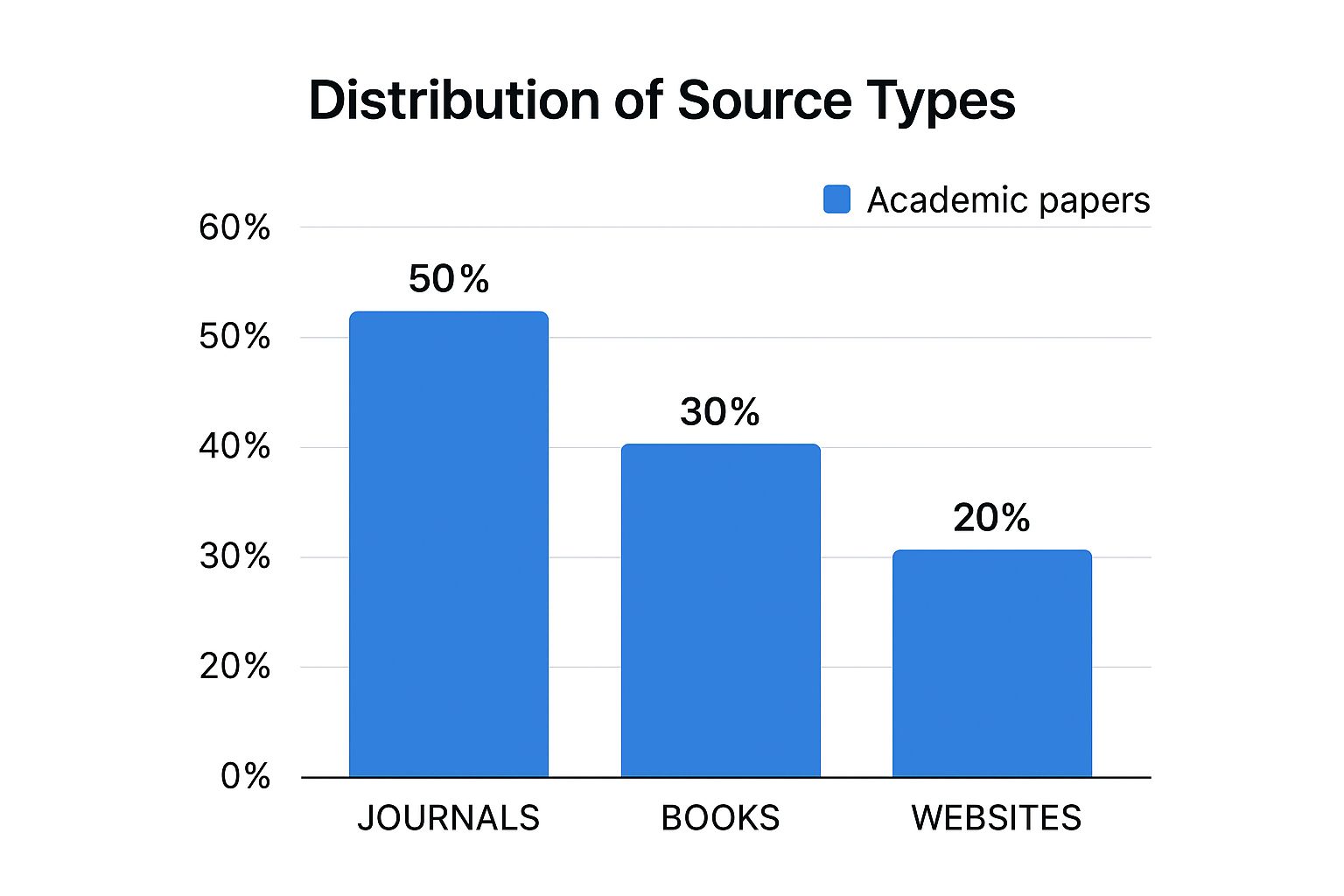Starting Your Academic Writing Journey With Confidence

Let's be honest: beginning to write academically can be intimidating. However, every experienced academic writer started somewhere. This section explores how to transform those initial anxieties into productive writing habits, giving you the confidence you need. We'll draw upon insights from seasoned academics and offer practical strategies for navigating the world of scholarly writing.
Breaking Down the Process
One of the biggest challenges in academic writing is the perceived enormity of the task. Large projects can feel overwhelming and even paralyzing. This is where breaking down the writing process becomes essential. Think of writing a research paper like building a house: you wouldn't attempt to construct the entire thing all at once. Instead, you would begin with blueprints, followed by the foundation, the walls, and so on.
Similarly, with academic writing, start by outlining your core arguments. Then, concentrate on developing each section individually. This approach makes the overall project much less intimidating and allows you to focus intently on individual components. For instance, if you are writing a literature review, begin by organizing your sources by theme or methodology. This effectively creates manageable chunks of information to work with.
Overcoming Perfectionism
Perfectionism can be a significant obstacle for many writers. Aiming for flawlessness from the very beginning can lead to procrastination and crippling writer's block. A much more productive strategy is to embrace imperfection in the initial stages of writing. Focus on simply getting your ideas down on paper without worrying too much about perfect grammar or phrasing.
Think of your first draft as a conversation with yourself, a space to explore and refine your thoughts organically. Tools like the SmartStudi Grammar Checker can help polish your work later in the process.
Building Sustainable Writing Habits
Consistency is the key to producing successful academic work. Developing a sustainable writing routine, even just 30 minutes per day, can drastically improve your productivity. Find a time and a place where you can concentrate without distractions. This could be a designated workspace at home or a quiet corner in the library.
The more frequently you write, the easier the process becomes. Building a regular writing habit is similar to exercising a muscle: it gets stronger with consistent practice.
Debunking Common Myths
Many aspiring academics hold mistaken beliefs about the writing process. One common myth is that good writers are born, not made. The reality is that academic writing is a learned skill that can be developed through practice and guidance. Another misconception is that academic writing should be overly complex and dense with jargon.
While precision is certainly important, clarity is paramount. The fundamental goal is to effectively communicate your ideas, not to obscure them behind complicated language.
Embracing Your Unique Perspective
The academic world thrives on a diversity of viewpoints. Your unique experiences and insights are valuable contributions to the ongoing scholarly conversation. Don't be afraid to let your individual voice shine through in your writing. The following table outlines the key differences between the realities of academic writing and some common myths that can hinder your progress.
To illustrate these points, let's examine a comparison of academic writing realities and common myths.
| Academic Writing Reality | Common Myth | Impact on Progress |
|---|---|---|
| Writing is a process of revision and refinement | Good writing is done in one go | Leads to procrastination and discouragement |
| Clarity and conciseness are essential | Complexity equals intelligence | Obscures meaning and alienates readers |
| Your perspective matters | Academic writing is impersonal and objective | Suppresses original thought and creativity |
By understanding the actual realities of academic writing, you can approach your work with greater confidence and a clearer sense of purpose. Remember, effective academic writing is about clearly communicating your ideas, supporting those ideas with solid evidence, and engaging in a meaningful dialogue within your chosen field.
Mastering Academic Standards Without Losing Your Voice
Academic writing can often feel rigid and formal, with strict rules and expectations. However, mastering these academic standards doesn't mean sacrificing your unique perspective. Instead, think of these standards as the foundation upon which your original ideas can flourish. This section explores the framework of scholarly writing, demonstrating how structure can actually strengthen your arguments.
Understanding the Core Components of Academic Writing
Like a well-crafted story, academic writing follows a structured format. Each component, from the abstract to the conclusion, serves a distinct purpose. A strong abstract acts as a compelling introduction, inviting the reader to explore your work. The body paragraphs then develop your arguments, providing supporting evidence and analysis. Finally, the conclusion synthesizes your findings, offering lasting insights.
For instance, consider a paper examining the influence of social media on political discourse. Your abstract would briefly outline the topic, your central argument, and key findings. The body paragraphs would delve into specific examples, analyzing various social media platforms and their impact on political campaigns. The conclusion would then tie everything together, potentially suggesting avenues for future research.
Citation Styles and Formatting: Strengthening Your Arguments
Different citation styles, such as MLA, APA, or Chicago, exist for a reason. They serve distinct purposes within various academic disciplines. These styles establish a consistent system for acknowledging sources, ensuring academic integrity and enabling readers to easily verify your information. For additional help with grammar and citations, check out this helpful resource: How to master grammar and citations.
Furthermore, consistent formatting, including font styles, headings, and subheadings, enhances your arguments by improving readability and clarity. It's similar to organizing a presentation: a clear structure makes it easier for the audience to follow your points.
Academic Integrity: Your Foundation for Credibility
Academic integrity forms the cornerstone of scholarly work. It involves honestly presenting research, accurately citing sources, and avoiding plagiarism. Maintaining academic integrity is crucial for building credibility as a scholar. It also contributes to the overall trustworthiness and reliability of academic discourse. The increasing focus on standards-driven education, emphasizing grade-level standards and measurable learning outcomes, underscores the growing importance of academic integrity. This trend indicates that institutions are shifting towards more structured assessments of academic writing, with increased emphasis on clarity, coherence, and adherence to established standards. You can delve deeper into these trends here: 2025 Academic Trends.
Finding Your Voice Within the Framework
While adhering to academic standards is essential, it shouldn't stifle your individual perspective. Think of these standards as a framework for your ideas, not a constraint. Your voice—your unique style, insights, and arguments—is what makes your work compelling and valuable. Learning academic writing is about balancing structure with your own contributions.
The objective isn't to simply replicate existing scholarship. It's to contribute your own perspective to the ongoing academic conversation. This involves crafting arguments that are both rigorous and reflective of your intellectual journey. By mastering the structure of academic writing, you create a solid platform for your voice to be heard with clarity and authority.
Research And Literature Reviews That Actually Work

Research forms the foundation of academic writing. The vast amount of available information can, however, feel overwhelming. The key is not to read everything, but to read strategically. This section explores how successful researchers navigate the complexities of information gathering, transforming potential overload into focused, well-structured arguments.
Navigating Academic Databases Effectively
Imagine searching a vast library for a specific book without a catalog. Academic databases serve as your catalog, offering powerful tools to locate relevant sources efficiently. Mastering advanced search techniques, like using Boolean operators (AND, OR, NOT) and wildcard characters, can significantly refine your search and save valuable time. For instance, a search for "social media" AND "political influence" provides more targeted results than simply searching for "social media."
Exploring databases specific to your field of study can also uncover valuable resources you might otherwise miss. This focused approach helps you concentrate on the most relevant scholarship in your discipline.
Evaluating Source Credibility: A Critical Skill
Not every source holds the same value. Developing the skill to assess source credibility quickly is essential for constructing strong arguments. Consider factors such as the author's expertise, the publication's reputation, and the publication date. A peer-reviewed journal article, for example, typically carries more weight than a blog post.
It's also crucial to consider the source's potential biases and conflicts of interest to maintain objectivity. This critical evaluation ensures your arguments are built on a foundation of credible evidence.
Efficient Note-Taking: Serving Your Writing Process
Effective note-taking goes beyond summarizing; it's about linking information to your research questions. Establish a system that works best for you, whether using digital note-taking applications like Evernote or traditional methods. Concentrate on recording key arguments, supporting evidence, and your own thoughts on the source's relevance.
This strategic approach streamlines writing by creating an easily accessible and organized collection of information. This allows you to synthesize complex information effectively. For additional guidance on citations, check out this helpful guide on How to master citations. Polishing your work is essential, so consider these proofreading tips for a professional finish.
Conducting Systematic Literature Reviews
A literature review is more than just a summary of sources; it's a synthesis of existing scholarship. It helps identify research gaps and positions your work within the broader academic field. Begin by clearly defining your research question, then systematically search for and analyze relevant literature. Organize your findings thematically, highlighting common themes, differing viewpoints, and unexplored areas.
This structured approach not only demonstrates your grasp of existing research but also lays the groundwork for your own original contributions. By identifying gaps in current scholarship, you establish a clear rationale for your work and its importance to the field.
Building Arguments That Convince And Engage
Academic writing thrives on compelling arguments that genuinely contribute to the field. This section explores strategies for constructing arguments that not only persuade but also captivate your academic audience. This involves developing a clear thesis statement, structuring your arguments logically, and using evidence effectively.
Crafting a Compelling Thesis Statement
A strong thesis statement forms the core of any academic argument. It serves as a roadmap, guiding both the writer and the reader through the central ideas of the paper. Consider it the foundation upon which your entire argument rests. Your thesis should be specific, arguable, and offer valuable insights. It should present a claim that necessitates further exploration and supporting evidence. For instance, instead of a general statement like, "Social media is important," a more effective thesis might be, "Social media's impact on political discourse has reshaped modern election campaigns by facilitating direct engagement between candidates and voters." This revised thesis offers greater specificity and a clear direction for the argument.
Structuring Arguments Logically
A well-structured argument unfolds logically, guiding the reader through a clear line of reasoning. This can be accomplished by arranging your points in a coherent sequence, using topic sentences to introduce the main idea of each paragraph. Each point should build upon the previous one, creating a cohesive and persuasive narrative.
Transitional phrases, such as "Furthermore," "However," and "In contrast," create smooth connections between ideas, ensuring a fluid and logical flow. This clear structure helps readers follow your line of reasoning without getting lost in the details.
Strategic Use of Evidence
Substantiating your arguments with robust evidence is crucial in academic writing. This evidence may include statistical data, research findings, historical examples, or expert opinions. The key is to employ evidence strategically, selecting the most relevant and impactful data to support your claims. Securing funding is often crucial to support research. For further guidance on this, explore resources on how to write a research grant proposal. Understanding the typical distribution of source types in academic papers can offer valuable insights into evidence usage. The infographic below visualizes this distribution.

As the infographic demonstrates, journals represent the primary source at 50%, followed by books at 30%, and websites at 20%. This distribution highlights the significance of using peer-reviewed journals as primary sources in academic writing to enhance credibility and rigor.
To further illustrate effective argumentation strategies, let's consider different argument types and their applications. The following table provides a helpful overview.
Academic Argument Types And Their Strategic Uses
Different argument structures and their most effective applications across academic disciplines
| Argument Type | Best Applied To | Key Features | Common Disciplines |
|---|---|---|---|
| Cause and Effect | Explaining the relationship between events or phenomena | Establishing a clear causal link, supported by evidence | History, Sociology, Science |
| Comparison and Contrast | Analyzing similarities and differences between two or more subjects | Identifying key points of comparison, highlighting both similarities and differences | Literature, Political Science, Anthropology |
| Evaluation | Assessing the merits or weaknesses of a particular subject | Establishing clear criteria for evaluation, providing supporting evidence | Film Studies, Art History, Business |
| Proposal | Advocating for a specific course of action | Clearly outlining the proposed action, justifying its necessity and feasibility | Engineering, Public Health, Education |
This table summarizes various argument structures commonly employed in academic writing, highlighting their key features and relevant disciplines. Choosing the right argument type is essential for effectively conveying your ideas and engaging your audience.
Addressing Counterarguments
Acknowledging and addressing counterarguments strengthens your position by demonstrating intellectual honesty and a comprehensive understanding of the topic. Instead of dismissing opposing viewpoints, engage with them directly. This shows that you've considered alternative perspectives and can effectively defend your own. Refuting counterarguments enhances your credibility and persuasive power.
Balancing Theory and Examples
Effective academic writing balances theoretical frameworks with concrete examples. Theory provides the conceptual foundation for your argument, while examples bring those concepts to life, making them more accessible and understandable for the reader. This balance ensures your arguments resonate with both specialists and a wider academic audience, adding depth and practical application to your analysis.
Maintaining Objectivity and Passion
Maintaining objectivity while advocating for your ideas is a hallmark of strong academic writing. Objectivity involves presenting evidence fairly, avoiding emotional appeals, and acknowledging limitations. However, this doesn't mean sacrificing your intellectual curiosity and enthusiasm for the topic. The most compelling academic writing often conveys a sense of intellectual engagement and passion.
Smart Technology Use In Academic Writing
Integrating smart technology can significantly benefit modern academic writing. The key is strategic application, avoiding over-reliance. This section explores how successful academics leverage technology to enhance their writing without compromising originality.
Leveraging AI Writing Assistants Ethically
AI writing assistants like Jasper provide valuable tools for brainstorming, outlining, and drafting. However, intellectual honesty is paramount. These tools should support, not substitute, your thinking and writing. Always thoroughly review and edit AI-generated text to ensure alignment with your arguments and unique voice. Proper attribution is also crucial when incorporating any AI-generated content to maintain ethical standards and academic integrity.
Your critical thinking and analysis remain core to the academic writing process, while AI serves as a valuable aid.
Research Management Software: Organizing Your Sources
Research management software such as Zotero or Mendeley facilitates efficient source organization. These tools allow you to store, annotate, and cite references easily, streamlining your research. This is especially helpful when working with numerous sources for literature reviews or dissertations.
Centralizing research materials makes revisiting sources, tracking progress, and ensuring accurate citations straightforward. This saves time and promotes consistency.
Collaboration Platforms: Enhancing Teamwork
Collaboration platforms such as Google Docs or Microsoft Teams enable seamless teamwork on group projects by allowing simultaneous editing and feedback sharing. These platforms provide a central hub for contributions, comments, and draft revisions.
This fosters a more dynamic and interactive writing process, particularly beneficial for collaborative research projects. Features like version history and commenting tools streamline editing and ensure everyone remains aligned. This can substantially improve efficiency and overall project quality. The integration of AI in academic writing is a noteworthy advancement, with the AI writing tools industry experiencing rapid growth, demonstrating a 36.6% compound annual growth rate (CAGR). You can find more detailed statistics here: AI writing statistics.
Practical Applications for Other Tools
Beyond AI assistants and research management software, various other technologies can elevate academic writing. Grammar and style checkers like Grammarly refine your prose, while citation management systems guarantee accurate referencing. Data analysis software supports the processing of quantitative data, empowering strong evidence-based arguments.
For instance, grammar checkers identify common errors like subject-verb disagreement and punctuation mistakes, helping you refine your writing and present a polished final product.
Maintaining Academic Integrity in the Digital Age
As technology becomes further ingrained in academic writing, maintaining academic integrity is increasingly vital. Responsible technology use involves understanding the ethical implications of AI tools, practicing proper attribution, and diligently avoiding plagiarism. It also requires acknowledging technology’s limitations and prioritizing your critical thinking skills. This ensures your work remains original and reflects your intellectual contributions.
Strategically embracing technology can empower you to write academically with enhanced efficiency and impact. Thoughtfully integrating these tools into your workflow strengthens your research, organization, and writing process while upholding the highest standards of academic integrity.
Getting Your Academic Work Published and Noticed

Completing your academic writing is a significant accomplishment. But the real journey begins when you share your work with the academic community. This requires a strategic approach to publishing. You'll need to select the right publication venues and understand the complexities of peer review. This section provides a guide for navigating the publication process and ensuring your scholarly work has maximum impact.
Selecting the Right Journal
Choosing the right journal is crucial. Consider factors like the journal's scope, target audience, and impact factor. Your research topic should align with the journal's scope. The intended audience will influence your writing style and tone. The impact factor indicates the journal's influence within the academic field. A higher impact factor generally suggests a broader reach and increased potential for citations. For instance, a highly specialized journal may be best for niche research, while a broader journal might suit work with wider implications.
Navigating the Peer Review Process
Peer review is a cornerstone of academic publishing. Experts in your field will evaluate your work before publication. While potentially daunting, this process ensures quality and strengthens your research. Be prepared for constructive criticism and see feedback as a chance to improve. Addressing reviewers' comments thoughtfully demonstrates your responsiveness and enhances your scholarship’s rigor. This collaborative aspect of peer review ultimately elevates the quality and credibility of published work.
Understanding Open Access Publishing
Open access publishing is increasingly important. It makes research freely available globally, removing paywalls and expanding access to knowledge. While article processing charges (APCs) often exist, many funding agencies now offer grants specifically for these costs. This growing support for open access underscores the value placed on readily accessible research.
Leveraging Digital Platforms for Wider Reach
Digital platforms provide powerful ways to expand your work's reach. Creating an online presence via websites, academic social media, and online forums helps you connect with a wider audience. Sharing preprints on platforms like arXiv allows rapid dissemination and early discussions with colleagues. You might find this helpful: How to master academic writing and get better results.
Furthermore, understanding the trends and challenges in academic publishing is essential. Using social media to promote academic work is one key trend that has proven influential. For example, Fyodor Dostoevsky's White Nights saw renewed interest through promotion on platforms like TikTok. Learn more: Current trends in academic publishing. This emphasizes the need for scholars to adapt to digital trends for increased visibility and engagement.
Writing Abstracts that Capture Attention
A strong abstract is the gateway to your research. It should concisely summarize key findings and contributions, acting as your elevator pitch to potential readers. A well-written abstract entices readers to explore your work further by clearly articulating the research question, methodology, results, and implications.
Presenting at Conferences
Conferences offer valuable opportunities to present your research, get feedback, and network within your field. Craft compelling presentations highlighting your work’s most significant aspects. Practice your delivery for clear, engaging communication. These interactions can spark valuable collaborations and further refine your work.
Handling Rejection Constructively
Rejection is a normal part of academic publishing. Don't let setbacks discourage you. View rejection as a chance to revise and improve. Carefully consider reviewer feedback and use it to strengthen your arguments and writing. Persistence and a willingness to learn from critiques are vital for success. Each submission, regardless of outcome, is a learning experience. By embracing these challenges, you hone your skills and increase your chances of eventual publication.
Key Takeaways
Your academic writing journey begins now. This section distills proven techniques into actionable advice you can implement immediately, regardless of whether you're crafting your first research paper or refining your established approach. We'll explore how to establish sustainable writing habits, develop your unique scholarly voice, and create systems for continuous improvement.
Building a Sustainable Writing Practice
Consistency is key to successful academic writing. Dedicate even a short period of 15-30 minutes each day to writing. This regular practice strengthens your writing skills, making the process feel less daunting and more natural over time. Find a dedicated workspace free of distractions and establish a routine you can stick to. This consistency helps overcome procrastination and builds momentum.
Developing Your Unique Scholarly Voice
While adhering to academic conventions is essential, your individual perspective adds significant value to your work. Your voice—your unique style and insights—distinguishes your writing. Don't try to emulate other writers. Instead, integrate your own insights and observations while maintaining objectivity and supporting your claims with credible evidence.
Creating Systems for Continuous Improvement
Academic writing is a continuous learning process. Actively seek feedback and embrace constructive criticism. Each revision strengthens your writing. Track your progress and identify areas for improvement. Are you struggling with literature reviews or constructing strong arguments? Focus your efforts on those areas.
-
Checklists for Different Stages: Create customized checklists for each stage of your writing process, from initial brainstorming to final proofreading. This ensures thoroughness and promotes effective organization.
-
Goal-Setting Frameworks: Set realistic writing goals. Break larger projects into smaller, manageable tasks. This prevents feeling overwhelmed and fosters a sense of progress. Celebrate these small wins to stay motivated.
-
Progress-Tracking Methods: Use tools to track your writing progress. This could be a simple spreadsheet, a dedicated writing app like Scrivener, or even a handwritten journal.
Managing Setbacks and Celebrating Progress
The academic writing process isn't always linear. Setbacks and challenges are a normal part of the process. Develop strategies for managing these inevitable bumps in the road. Don't let rejection discourage you. Reframe setbacks as learning experiences.
-
Success Indicators: Identify key success indicators for yourself. This might include completing a first draft, receiving positive feedback, or having your work published. Recognizing these successes reinforces positive writing behaviors.
-
Adaptation Strategies: Be flexible and willing to adapt your approach as needed. What worked for one project might not work for another. Experiment with different strategies to discover what best suits your writing style and research goals.
Maintaining Perspective
Maintain a balanced perspective throughout your academic writing journey. Remember why you chose this path. Reconnect with your passion for research and the intellectual curiosity that drives your work. This renewed sense of purpose provides the motivation needed to navigate challenges and celebrate successes.
